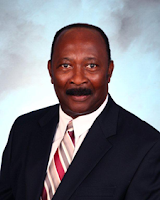Social responsibility is one of Union’s foremost values, and
I see it displayed every day in the passion of the leaders who work and teach
at Union. This month I am happy to recognize Professor Lawrence E. Hibbert as one of the outstanding faculty members who embodies that value in unique ways.
 Professor
Lawrence E. Hibbert is the Director of the Criminal Justice Program in Miami,
Florida. He has been part of Union’s full-time faculty since 2006, and it is
through his servant leadership, innovative outreach and program development
that the Criminal Justice Program has experienced such success.
Professor
Lawrence E. Hibbert is the Director of the Criminal Justice Program in Miami,
Florida. He has been part of Union’s full-time faculty since 2006, and it is
through his servant leadership, innovative outreach and program development
that the Criminal Justice Program has experienced such success.
Professor
Hibbert served for many years as a Sergeant of Police in Jamaica, where he was
born. When he came to the United States in
1980, he worked full time while completing his bachelor’s
degree in Union Institute & University’s business management program.
Professor Hibbert went on to the master’s program in dispute resolution at the
Nova Southeastern University in Ft. Lauderdale, Florida. He completed both
degrees while continuing to work and support his family.
According
to Professor Hibbert, many officers come to Union with reservations—they do not
know if they can complete their degree and continue to work full time. He is
able to empathize and share his own experience with them and encourage them
through their courses and, ultimately, across the graduation stage. He knows
that completing a degree takes time, scheduling, focus, and dedication. Because
of that care and empathy, Professor Hibbert is a trusted mentor and counselor
for officers pursuing their degrees.
One
of the new developments for the Criminal Justice program in Miami is the addition
of a new off-site classroom at the Miami Dade Police Academy—the largest police
department in South Florida. This makes a total of eight off-site classrooms
that the Miami Center has established throughout southeast Florida. These
off-site locations are key strategy components for program enrollment. This
allows thousands of officers to find out about Union and the opportunities to
complete their bachelor’s degrees and qualify for promotions. “I know it’s a
feather in my cap to get into the academy where they train all their officers,”
Professor Hibbert said. “Being there when the new officers come in, they‘re
going to see that there are other officers who are completing their degrees, and they’re going to want to be a
part of it. That will help us a lot with recruiting.”
In
addition to expanding class offerings through off-campus sites, the Miami
Center offers Saturday tutoring sessions where students can receive one-on-one
instruction in writing, math, and questions relating to their respective
programs. Participating in these Saturday tutoring sessions is one of the ways
that Professor Hibbert has made the Criminal Justice program so attractive to
the students. These tutoring sessions are tangible retention practices that
have kept the academic program strong.
When
asked about the role of social responsibility in his life, Professor Hibbert
said, “Being socially responsible means that I must behave ethically and with
sensitivity towards everyone. Striving for social responsibility helps me to
have a positive impact on students and prospective students of Union Institute
& University and the South Florida community as a whole.
I
believe that my commitment to social responsibility is reflected by the activities
I choose to participate in and the lifestyle I lead as a husband, father,
grandfather, colleague, and faculty member. Only through embracing and
embedding a sense of social responsibility into your personal value and belief
system can you truly become socially responsible in all that you do.
This
is my motto and I live by it: ‘I am of the opinion that my life belongs to the
whole community and as long as I live it is my privilege to do for it whatever
I can. I want to be thoroughly used up when I die. For the harder I work the
more I live.’” (George Bernard Shaw)

No comments:
Post a Comment